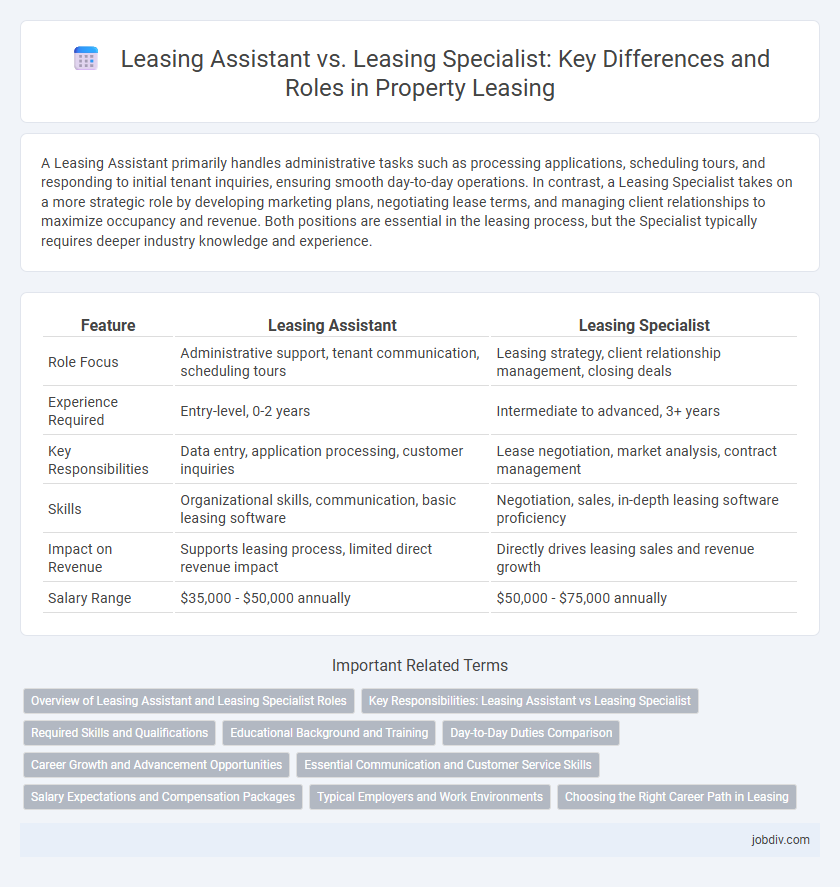A Leasing Assistant primarily handles administrative tasks such as processing applications, scheduling tours, and responding to initial tenant inquiries, ensuring smooth day-to-day operations. In contrast, a Leasing Specialist takes on a more strategic role by developing marketing plans, negotiating lease terms, and managing client relationships to maximize occupancy and revenue. Both positions are essential in the leasing process, but the Specialist typically requires deeper industry knowledge and experience.
Table of Comparison
| Feature | Leasing Assistant | Leasing Specialist |
|---|---|---|
| Role Focus | Administrative support, tenant communication, scheduling tours | Leasing strategy, client relationship management, closing deals |
| Experience Required | Entry-level, 0-2 years | Intermediate to advanced, 3+ years |
| Key Responsibilities | Data entry, application processing, customer inquiries | Lease negotiation, market analysis, contract management |
| Skills | Organizational skills, communication, basic leasing software | Negotiation, sales, in-depth leasing software proficiency |
| Impact on Revenue | Supports leasing process, limited direct revenue impact | Directly drives leasing sales and revenue growth |
| Salary Range | $35,000 - $50,000 annually | $50,000 - $75,000 annually |
Overview of Leasing Assistant and Leasing Specialist Roles
Leasing assistants support property management teams by handling administrative tasks such as tenant inquiries, compiling leasing documentation, and scheduling property showings to ensure efficient leasing operations. Leasing specialists focus more extensively on leasing activities, including conducting property tours, negotiating lease terms, and processing lease agreements to drive occupancy rates. Both roles are essential in property leasing, with assistants providing operational support and specialists engaging directly in tenant acquisition and lease management.
Key Responsibilities: Leasing Assistant vs Leasing Specialist
Leasing Assistants handle tenant inquiries, schedule property tours, and assist with application processing, focusing on customer service and administrative support. Leasing Specialists manage lease negotiations, coordinate lease execution, and ensure compliance with property management policies, emphasizing contract management and regulatory adherence. Both roles contribute to tenant retention and property occupancy, with distinct responsibilities in daily operations and lease lifecycle management.
Required Skills and Qualifications
Leasing Assistants require strong organizational skills, customer service experience, and basic knowledge of property management software to support leasing teams effectively. Leasing Specialists must demonstrate advanced communication abilities, in-depth understanding of leasing regulations, and proficiency in contract negotiation to handle complex leasing transactions independently. Both roles prioritize attention to detail, familiarity with fair housing laws, and the ability to manage multiple client interactions efficiently.
Educational Background and Training
Leasing Assistants typically hold a high school diploma and receive on-the-job training focused on customer service, leasing software, and basic property management tasks. Leasing Specialists often possess an associate or bachelor's degree in business, real estate, or a related field, accompanied by formal certifications such as Certified Apartment Leasing Professional (CALP). Advanced training for Leasing Specialists includes in-depth knowledge of leasing laws, market analysis, and negotiation skills to support complex leasing transactions.
Day-to-Day Duties Comparison
Leasing Assistants primarily handle front-line tasks such as greeting prospective tenants, answering calls, and scheduling property tours, ensuring a smooth initial leasing experience. Leasing Specialists engage in more in-depth duties like processing applications, conducting background checks, and negotiating lease terms to finalize agreements. Both roles require strong customer service skills, but Leasing Specialists carry greater responsibility in managing lease documentation and compliance.
Career Growth and Advancement Opportunities
Leasing Assistants gain foundational experience managing tenant inquiries and processing applications, paving the way for promotion to Leasing Specialist roles with increased responsibilities in lease negotiations and property marketing. Leasing Specialists typically command higher salaries and develop specialized skills in tenant relations, financial analysis, and portfolio management, enhancing their career trajectories toward property management or real estate sales. Advancing from Assistant to Specialist positions accelerates exposure to strategic decision-making and leadership opportunities within the real estate leasing industry.
Essential Communication and Customer Service Skills
Leasing Assistants excel in basic communication and customer service, handling inquiries and scheduling appointments to support leasing operations efficiently. Leasing Specialists demonstrate advanced communication skills, including negotiation and conflict resolution, ensuring prospective tenants receive personalized service tailored to their needs. Both roles require strong interpersonal abilities, but Leasing Specialists engage more deeply in client relationship management to drive leasing success.
Salary Expectations and Compensation Packages
Leasing Assistants typically earn an average salary ranging from $30,000 to $40,000 annually, reflecting entry-level responsibilities and support roles in leasing operations. Leasing Specialists command higher compensation, often between $45,000 and $60,000 per year, due to their advanced duties such as tenant relations, lease negotiations, and market analysis. Compensation packages for Leasing Specialists frequently include performance bonuses, commission structures, and enhanced benefits compared to the more standardized pay and benefits offered to Leasing Assistants.
Typical Employers and Work Environments
Leasing Assistants typically work for residential property management companies, real estate agencies, and apartment complexes, supporting Leasing Specialists in tenant relations and administrative tasks. Leasing Specialists are commonly employed by commercial real estate firms, office building owners, and retail property managers, focusing on lease negotiations and client interactions in fast-paced office environments. Both roles frequently operate within property management offices, but Leasing Specialists often have greater responsibility in high-stakes leasing markets.
Choosing the Right Career Path in Leasing
Leasing Assistants handle administrative tasks such as processing tenant applications, scheduling tours, and maintaining leasing documents, making it an ideal entry-level position for gaining foundational knowledge in property management. Leasing Specialists focus on tenant relations, market analysis, and lease negotiations, requiring more experience and offering greater responsibility and career growth opportunities. Choosing between these roles depends on your career goals; if you prefer a customer-focused, strategic role with higher earning potential, aiming for Leasing Specialist is beneficial, while Leasing Assistant suits those seeking to build core leasing skills.
Leasing Assistant vs Leasing Specialist Infographic

 jobdiv.com
jobdiv.com